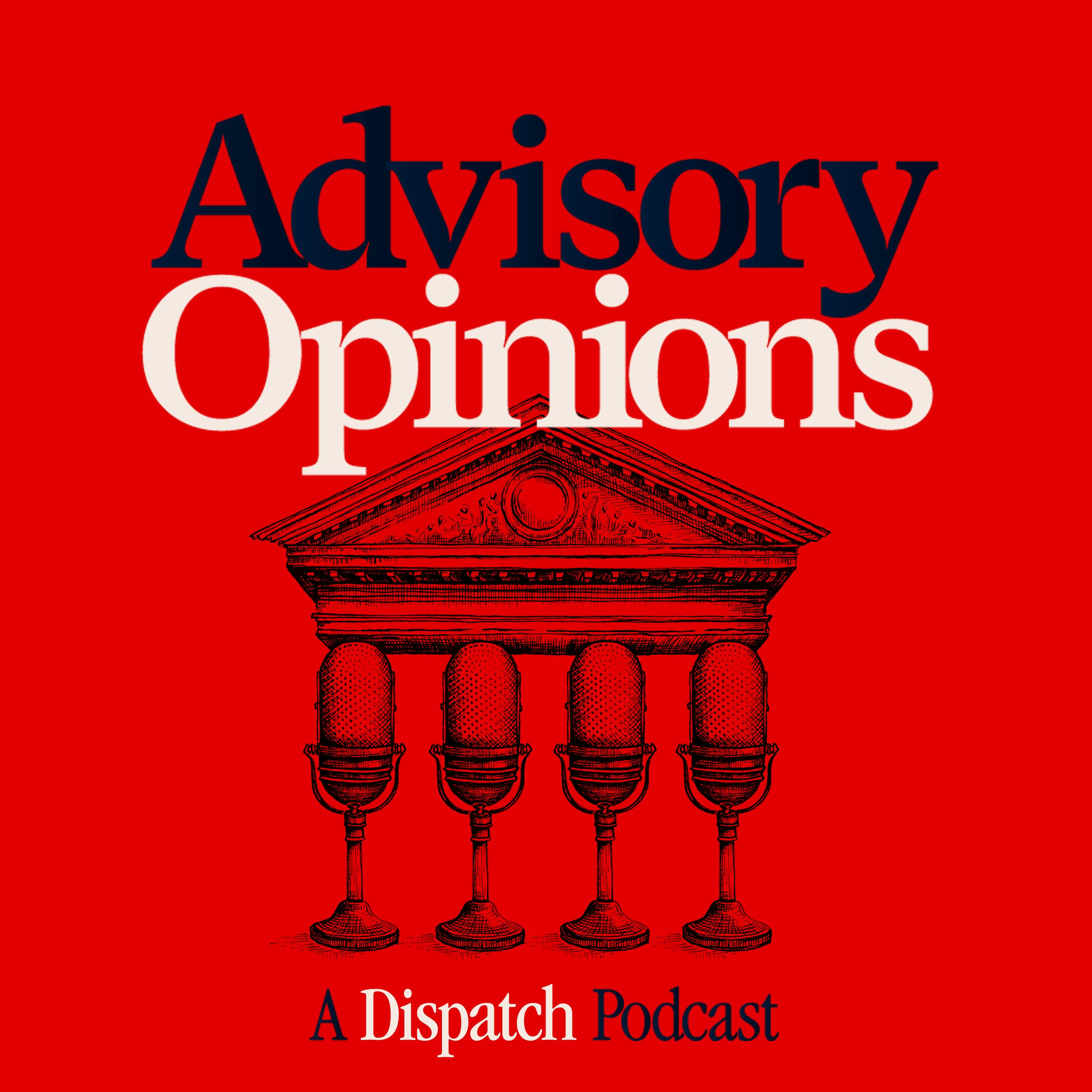

Advisory Opinions
The Dispatch
Advisory Opinions is a legal podcast by The Dispatch. Hosts David French and Sarah Isgur meet twice a week to talk about the law, the courts, their collision with politics, and why it all matters.
Episodes
Mentioned books

14 snips
Nov 13, 2025 • 1h 8min
Everyone Needs to Stay in Their Lane
A compelling discussion unfolds around the nondelegation doctrine and Congress's authority to delegate. The legal implications of Dave Portnoy’s recent confrontation are examined alongside the troubling nuances of the disturbing the peace statute. There's a spotlight on notable Supreme Court cases, including the potential reevaluation of tribal plenary power. Additionally, the rights of service members in military strikes are analyzed, alongside proposed reforms for heightened accountability of federal officers. Expect engaging legal insights and contemporary relevance throughout.

7 snips
Nov 11, 2025 • 1h 13min
The Federalist Society Takes a Stand
Judge Jennifer Elrod, Chief Judge of the U.S. Court of Appeals for the Fifth Circuit, addresses the judicial funding crisis and its stark impact on court operations. She reveals the struggles faced by CJA attorneys, who have gone unpaid since July, and discusses the constitutional and practical consequences of prolonged funding gaps. Elrod highlights the importance of action from Congress and shares insights into her role as a chief judge, navigating challenges while ensuring the judiciary functions effectively.

56 snips
Nov 5, 2025 • 1h 10min
Supreme Court Hears Oral Argument in Trump’s Tariff Case
Joining the discussion are David Lat, founder of the Original Jurisdiction newsletter, Roman Martinez, global chair of Supreme Court and appellate practice at Latham & Watkins, and Amy Howe, veteran SCOTUS reporter. They dive deep into Trump's tariff case, exploring the potential swing justices and their implications. Lat praises advocacy performances while Martinez analyzes major questions and nondelegation. Howe offers a firsthand courtroom view, and they reflect on the balance of power and executive overreach in this landmark legal battle.

44 snips
Nov 4, 2025 • 1h 9min
Trump’s Tariff Showdown
A major Supreme Court case on Trump's tariffs takes center stage, challenging his authority to impose widespread tariffs. The hosts dissect core legal questions, including the interpretation of emergency powers under the IEPA. They review diverse arguments presented by both the administration and opposing parties, alongside the implications of lower court rulings. Additionally, they explore the dynamics between liberal justices and the strategy surrounding amicus briefs. Expect insights on oral argument preparations and the impact of media narratives.

35 snips
Oct 30, 2025 • 1h
All About Substantive Due Process
Dive into the fascinating world of substantive due process as Sarah and David unravel its historical roots and implications. They tackle pivotal cases like Dred Scott and Obergefell, discussing how recent rulings may impact marriage rights. Enjoy a humorous take on leaked group chats among young Republicans, highlighting the extremes of tribal signaling. The hosts also ponder the delicate balance of unenumerated rights and originalism in modern jurisprudence, all while contemplating the future of legal precedent.

Oct 28, 2025 • 60min
Firing Squad vs. Suffocation
The podcast dives into the Eighth Amendment and a prisoner's request to die by firing squad, sparking a debate on humane execution methods. They also analyze recent legal actions regarding the National Guard in Portland and dissect the implications of horizontal stare decisis on judicial predictability. The hosts explore the pros and cons of the spoils system while considering who should present the tariff case at the Supreme Court. Lastly, they examine how presidential policies have influenced migration flows and the lasting impacts of such actions.

13 snips
Oct 23, 2025 • 1h 8min
Bad Man Smokes Weed Doctrine
A fascinating discussion unfolds around a Supreme Court case that questions if marijuana users can own firearms. The hosts tackle the complexities of police entering homes without warrants, weighing exigent circumstances against probable cause. They delve into presidential powers over the National Guard and debate how federal law distinguishes between protest and rebellion. A critique of gender dynamics in legal fields raises eyebrows, while intriguing historical precedents are revisited. The conversation is packed with legal insights and cultural commentary.

27 snips
Oct 21, 2025 • 54min
Euphemisms, Political Speech, and the First Amendment
Sarah and David tackle the buzz around the 'Let's Go Brandon' case and its implications for student speech in schools. They question whether euphemisms like this can be deemed vulgar and how vague standards complicate enforcement. The discussion shifts to the Supreme Court's confusion over the Calais oral arguments and the tensions between partisan and racial gerrymandering under Section 2. Finally, they delve into John Bolton's indictment, examining claims of selective prosecution versus legal accountability. A lively audience Q&A wraps up the thought-provoking session.

11 snips
Oct 16, 2025 • 60min
Vindictive Prosecutions
The hosts explore the pivotal Chiles v. Salazar case regarding conversion therapy bans for minors, debating its implications on First Amendment rights. They dissect the indictment against Letitia James for mortgage fraud, questioning its merits and whether it reflects 'lawfare.' Discussions also cover the legal strategies in James Comey's case, potential Supreme Court rulings on various critical arguments, and the balance of parental rights in student gender transitions. A wide-ranging analysis that connects legal precedent to contemporary issues makes for a captivating dialogue.

32 snips
Oct 14, 2025 • 46min
The Future of Free Speech
Sarah Isgur and David French engage in a lively discussion on threats to free speech, examining a Ball State employee's firing over social media posts. They delve into NYU's struggles with controversial speakers and the implications of 'jawboning' by the government. The duo explores anti-SLAPP laws, potential reforms for civic education, and the need for transparency in government communications. They emphasize that protecting free speech goes beyond legal measures, requiring cultural support and renewal.


